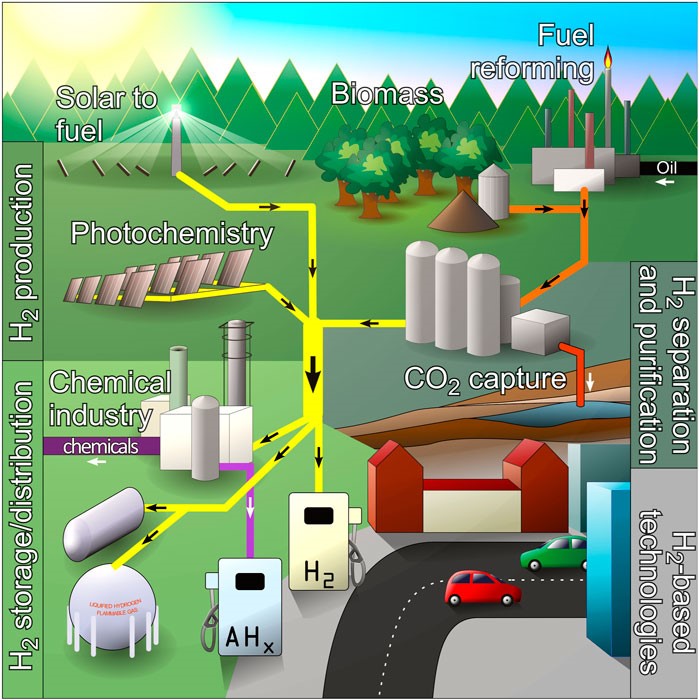
25 Apr HYDROGEN AND ITS TECHNOLOGICAL BREAKTHROUGH TO BECOME THE SUSTAINABLE ENERGY SYSTEM OF THE FUTURE
The European Commission (EC) has established numerous policies and initiatives to make Europe a climate neutral region by 2050.
In 2018, the energy producing industries and fuel combustion users had the largest share (53.5 %) of total greenhouse gas emissions, followed by the transport sector (24.6 %). Within the European Green Deal, essential actions related to energy and transport have been set up. Aligned with the Paris agreement to adapt to and mitigate climate change, the decarbonization of energy systems, the promotion of renewable energy sources and zero carbon footprint transport practices are three of the EC’s priorities for 2030 towards a sustainable European economy.
Hydrogen is expected to become themain system for long-lasting and sustainable energy storage and transport and the key connector for renewable energies. Hydrogen can be produced with a very-low (or even zero) carbon footprint (for example, when generated by electrolysis, photocatalysis, natural gas with carbon capture/reuse, biomass/biogas or other biological routes). Unlike other current systems, energy can be stably stored as hydrogen for long periods of time and be efficiently transported over long distances. Therefore, hydrogen could straightforwardly come to be the intermediate resilient energy storage and transport medium between renewable energy supply and final energy uses.

CLEAN HYDROGEN CALL FOR PROPOSALS 2022
To provide cutting-edge scientific and technological solutions for energy systems, the Clean Hydrogen Partnership (CleanH2JU) was established in November 2021. This partnership is a joint effort between public and private entities that support research and innovation activities (RIAs and IAs) related to hydrogen technologies in Europe. In order to accelerate the development and improvement of advanced clean hydrogen applications, the CleanH2JU Work Programme has one call for proposals for 2022 with 41 topics and two deadlines: 31st May 2022 (26 topics) and 20th September 2022 (15 topics). The topics of the CleanH2JU Work Programme for 2022 cover 3 Pillars:
- Pillar 1 – Renewable Hydrogen Production. In order to achieve parity with current fossil fuels, renewable hydrogen needs to become cost-competitive (increasing efficiency for a variety of renewable hydrogen production routes and reduction of costs to around 5 €/kg at the pump) and its technologies need to be scaled up. To reach these goals, further improvements are required, with water electrolysis being the main technology supported by the 2022 calls.
- Pillar 2 – Hydrogen storage and distribution. Hydrogen is strategically expected to be used as an intermediate energy network for daily and/or seasonal storage. Thus, two main objectives have been set for 2022: to improve the security of hydrogen supply (for compressed and liquefied hydrogen) and to develop an EU-wide logistics infrastructure for the transport of hydrogen from renewable production areas to energy demand centers across Europe.
- Pillar 3 – Hydrogen end uses. CleanH2JU will fund research and innovation breakthroughs to promote hydrogen as a low-carbon fuel for transport, mainly on advances based on the current fuel cell modules and light/heavy duty vehicles. CleanH2JU also aims to support the European power generation and heating sectors with a portfolio of 100% hydrogen systems (or gas-hydrogen co-solutions) from domestic structures to large-scale power generation plants.
In addition, the CleanH2 Partnership will also give high priority to cross-cutting issues, such as the implementation of sustainability in the design and development process, with the application of Life Cycle Sustainability Assessment (LCSA), recycling, eco-design and circularity.
EXPERIENCE GAINED ON THE BASIS OF GOOD RESULTS
CONTACTICA, with over 10 years of experience in diverse Research and Development (R&D) fields, including energy, materials, biotechnology, environment, health, agri-food and eco-innovation, has extensive experience in the submission of this type of proposals, and has already obtained funding for more than 30 projects, two of them related to energy systems and hydrogen:
- CARESTOR was a H2020-granted project of 2.7 million € for the “Market uptake of sustainable and competitive carbons for energy storage”.
- Recently, MAST3RBOOST project, a 6 million € proposal, has been awarded in the first edition of Horizon Europe calls (HE2021) for the “Maturing the production standards of ultraporous structures for high density hydrogen storage bank operating on swinging temperatures and low compression”.
CONTACTICA provides a wide range of services for Research and Development projects. We accompany you throughout the entire proposal submission process, from the concept validation of the project, to the proposal writing and support in the submission process.


Sorry, the comment form is closed at this time.